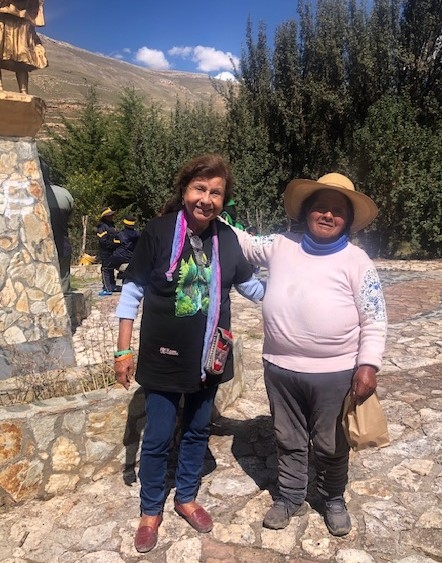Seven church members representing the Presbytery of San Jose recently traveled to Peru on a mission to observe and document what organizations there are doing for the environment.
They weren’t there, however, to tell the local people what to do or to fix problems.
“That doesn’t work,” said the Rev. Elizabeth Boatwright, who attends First Presbyterian Church of Mountain View and who went to Peru. “What we wanted to do is hear their story, their solutions, their dreams. Then our work is to prayerfully come alongside and work as a partner with them to pray and offer what resources we have to fulfill that dream.”
The key, said Boatwright, is making sure the Peruvians are “the owners of the solution.”
Team members visited Peru from May 19-26 and were particularly concerned with what Peruvian leaders are doing about local air and water pollution, oil spills, lead poisoning, corruption in mining practices, abuse of indigenous lands and illegal trade. The church members then returned to the United States and presented their findings to their local churches.
“We were told that very few people come to see and hear what has been going on and [hear] the local solutions to the need,” Boatwright said. “We were fired up to come back and tell the story.”
Team members were originally supposed to take the trip in 2020, but due to political unrest in Peru and complications with the COVID pandemic, it was postponed until 2024. Mission teams from the Presbytery of San Jose have previously traveled to Puerto Rico and Indonesia.
Team members represent six Presbyterian churches in Silicon Valley and Santa Cruz County. In addition to Boatwright, they are David Heacock, a member of Los Gatos Presbyterian; the Rev. Deborah Troester, pastor of Santa Teresa Hills Presbyterian; the Rev. Karla Kress from Saint Andrew Presbyterian in Aptos; Mary and Barry Vickery of Sunnyvale Presbyterian; and Olga Enciso Smith of Westminster Presbyterian in San Jose’s Rose Garden neighborhood.
The group visited four major areas in Peru, including a memorial in Lima that honors the thousands of Peruvians missing, kidnapped or killed during the “Shining Path” years of 1980-2000. The terrorist group Sendero Luminoso (“Shining Path”) conducted a campaign of violence in Peru that is responsible for more than 24,000 deaths.
Team members also visited the Chillon River in Callo. Callo has poor air due to oil refineries, and the river has been polluted with refuse and oil spills, according to Boatwright.
“This trip was tear-jerking for me to see the damage to the health and to the nature,” said Smith, a Los Gatos resident who is originally from Peru. “I’m full of gratitude for being part of this group and for the opportunity to witness this severe situation.”
The group also went to the town of La Oroya, which had a smelter that polluted the air for decades and resulted in lead poisoning among the majority of the population. According to Boatwright, 98.6 % of children ages 6-12 have extreme blood lead levels. The EPA and the Centers for Disease Control and Prevention agree that there is no known safe level of lead in children’s blood. . Lead may leave children mentally retarded or result in a reduced IQ, according to the World Health Organization.
Locals’ solution has been to plant trees to restore oxygen levels in La Oroya, Boatwright said. To that end, the team visited a bird sanctuary in Ventanilla and observed efforts to restore native plants and habitats for animals, and they traveled to Huancayo, where hydroponics and greenhouses are providing food in rural habitats.
“In addition, we also spoke with former teams and learned of their efforts in advocating for the local people both in Lima and regarding smelters in the United States,” said Boatwright.
She added that the response was “amazing” when the findings from Peru were presented to congregants at First Presbyterian Church in Mountain View.
“People were unaware of what indigenous people have suffered at the hands of unscrupulous practices,” Boatwright said. “My greatest hope is that people will consider supporting the efforts of the local people there to create healthy environments, encourage self-sustaining agriculture and community building, cease corrupt practices and offer solutions to fair trade.”
Team members hope to continue to spread the word.
“It is our prayer to be able to take our presentation to others in the community who want to join us and provide resources to fulfill their wishes,” Boatwright said.
